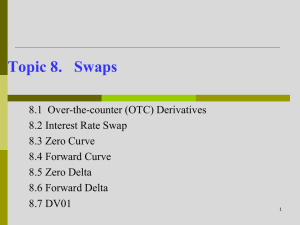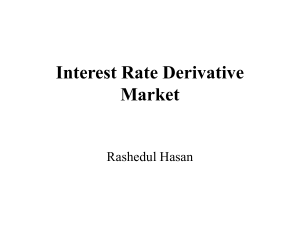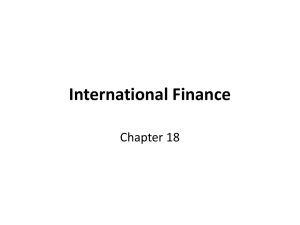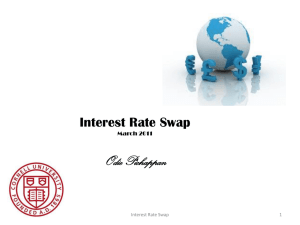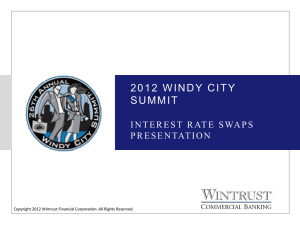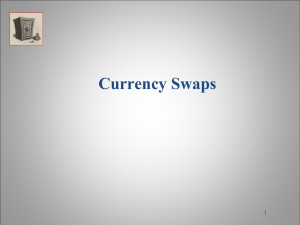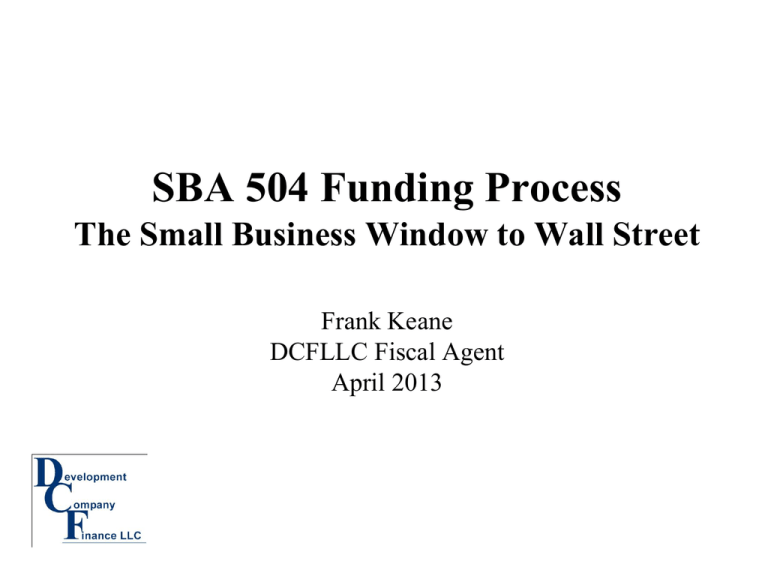
SBA 504 Funding Process
The Small Business Window to Wall Street
Frank Keane
DCFLLC Fiscal Agent
April 2013
504 Always Funding Small Businesses
•
Sections 503 (1958), 504 and 505 (1986) of the Small Business Investment
Act provide for guarantee and pooling of CDC-issued debentures and
guarantee and issuance of Development Company Participation
Certificates (DCPCs).
•
Section 503 guarantees full and timely debenture payments. Section 504
guarantees full and timely payments to DCPC holders.
•
Provides monthly access to fixed rate, long-term funding in the public
capital markets not otherwise available to small business.
•
Uses a proven securitization process to create appealing investments
resulting in efficiently-priced fixed-rate funding for small business
borrowers.
•
27 years of history have led to stable performance through multiple interest
rate and economic cycles and through large crises. Over $57 billion in
certificates have been issued with $27.1 billion outstanding.
SBA 504 Capital Markets Team
•
Fiscal Agent – DCFLLC. Manage the funding process to obtain the best
monthly debenture rate available for borrowers.
•
Underwriters – Credit Suisse and Bank of America. Market, sell and trade
DCPC, take capital risk, pool debentures, product research.
•
Issuing Agent and Trustee – The Bank of New York Mellon. Hold
debentures issued by CDCs, issue DCPCs as SBA’s agent, distribute P&I to
DCPC holders, report outstanding pool statistics.
•
Central Servicing Agent – Wells Fargo Corporate Trust Services. Process
loans, report new pool statistics to DCFC, collect loan payments, pay out
proceeds. Subsidiary of The Bank of New York Mellon.
•
Legal Counsel – Bingham McCutchen, LLP. Program and transaction legal
advisors to underwriters and DCFC.
From Borrowers to Investors: The Process
Issuer and
Trustee
(BNYM)
Debentures
Underwriters
Funds
(BoA, CS)
Certificates
Investors
Certificates
Debentures Funds
Fiscal Agent
Guarantee
on
Certificates
SBA Loan
Approval &
Guarantee
(DCFLLC)
Guarantee
on
Debentures
Source: Merrill Lynch Research, 1998.
Funds
Central
Servicing
Agent
(Wells Fargo
Corporate Trust
Services)
Debentures
Loan
Proceeds
Certified
Development
Companies
Small
Business
Borrowers’
Banks
Notes
DCPC Characteristics
DCPCs exactly match the full amortization, interest rate, maturity and
prepayment penalty schedule of the pooled debentures. P&I is paid
semiannually.
Prepayment penalty schedule starts at 100%+debenture interest rate
and declines ratably to par after 5 years (10-year maturity) or 10 years
(20-year maturity) ; e.g. 2013-20D, 2.08% 4/1/2033 has an initial
prepayment price of 102.08. Prepayments are allocated on a pro rata
basis
Acceleration of principal upon loan default is at par.
Obligation of the United States for federal income tax treatment
State/Local tax treatment is case-by-case. ERISA OK.
Range of coupons: high 10.75% (10/87 20-yr), low 1.93% (12/12 20yr). Original WAC 5.2%, outstanding WAC 4.7%.
Projected average life on a new 20-year par pool is 7.9 years at 5%
CPR (assuming zero CPR it is 10.9 years).
How is the Debenture Rate Determined?
•
Announcement and Price Guidance. Several days prior
to pricing on Thursday of the first full week of the month
including Sunday, the fiscal agent and underwriters agree
on a spread range over the appropriate interest rate swap
rate and announce the offering.
•
Marketing. Depending on the reception to the deal,
pricing occurs somewhere within the spread range. If there
is insufficient demand, a new range is determined and the
deal again marketed and/or there is underwriter takedown
of the unsold amount. If demand is strong then price
guidance is tightened.
How is the Debenture Rate Determined?
(continued)
•
Debenture Rate = treasury rate + swap rate + spread
to swap.
•
Swap Rate = treasury yield + swap spread. 20-year
504 loan uses 10-year swap rate, 10-year 504 loan
uses 5-year swap rate.
•
Pricing. Fiscal agent and underwriters agree on the
swap rate plus the spread to swap. The fiscal agent
accepts the debenture rate and obtains approvals from
Treasury and SBA.
What Are Interest Rate Swap Rates?
• Interest rate swap rates are the rates counterparties use
to swap floating and fixed rate cash flows;
• Swap rate = treasury yield + swap spread for the
appropriate maturity; e.g. 2013 20D, 2.08% 4/1/2033,
was priced using the treasury yield of 1.79% + swap
spread of +16 bps = 1.95%. So, the debenture was
priced at 2.08%,a spread of 13 bps to the swap rate.
• Swap rates became pricing benchmarks for all
mortgage-backed securities in the late 1990s.
• Find swap rates in the WSJ or here:
http://www.federalreserve.gov/releases/H15/
Who Buys DCPCs?
• Insurance companies – yield, safety and government
security status with yield very important to match their
liabilities.
• Bank Portfolios – yield, safety, government security
status. Held for sale and to maturity.
• Money Managers – on the behalf of other institutions
and individuals. Relative value/spread buyers. Includes
mutual funds, hedge funds.
• Minimum original denomination - $25,000 with
$1,000 multiples thereafter.
Why Do Investors Buy DCPCs?
•
Full faith and credit of the U.S. Highest quality.
•
Absolute yield, 5.2% WAC over program life. Wide
selection of coupons and prices.
•
Spread over treasuries/swaps in compensation for the
borrower prepayment option and lower liquidity.
•
Monthly offering calendar.
•
Well-supported secondary market.
•
Reasonably predictable cash flows.
•
Long history, rich prepayment/acceleration data.
Disclaimer
The information herein has been obtained from sources that
we believe to be reliable, but we do not guarantee its accuracy
or completeness.
DCFLLC, 2013.
All rights reserved.



